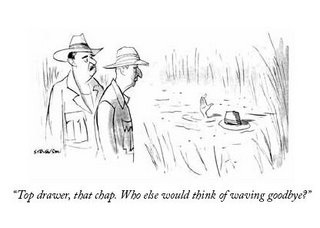Economic and Political Weekly dated September 14 2013 has an article titled: "Waving or Drowning / Developing Countries after the Financial Crisis" by Yilmaz Akyüz.
"...India has been relying on the supply of labour to the rest of the world, not by converting them into higher-value manufactures, but by exporting unskilled workers and information and telecommunications (IT) and other labour services of a very small proportion of its total labour force (Nabar-Bhaduri and Vernengo 2012)..."
Although I have quoted a small para from the article, the objective of this blog-post is very different.
The title reminds me of two things:
Poem by Stevie Smith (1903-1971) and cartoon by James Stevenson, both excellent.
"And not waving but drowning
Nobody heard him, the dead man,
But still he lay moaning:
I was much further out than you thought
And not waving but drowning.
Poor chap, he always loved larking
And now he's dead
It must have been too cold for him his heart gave way,
They said.
Oh, no no no, it was too cold always
(Still the dead one lay moaning)
I was much too far out all my life
And not waving but drowning."
 Artist : James Stevenson (b 1929- ), The New Yorker, 19 November 1960
Artist : James Stevenson (b 1929- ), The New Yorker, 19 November 1960